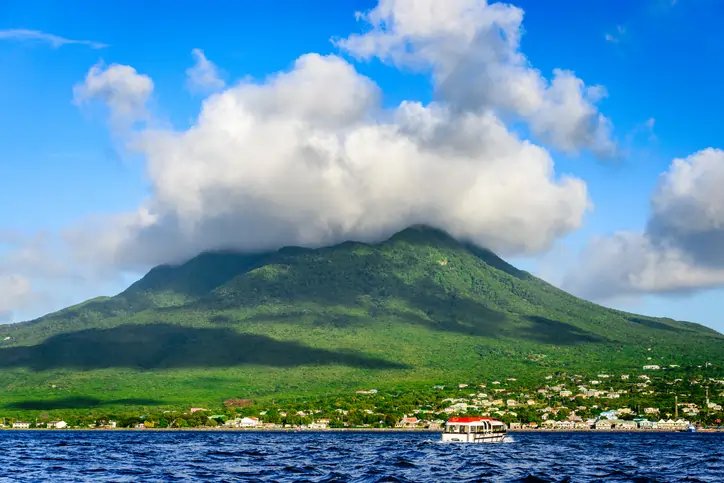The Island of Nevis: A Bright 2025 Beckons
Published by Jessica Weisman-Pitts
Posted on December 19, 2024
4 min readLast updated: January 28, 2026

Published by Jessica Weisman-Pitts
Posted on December 19, 2024
4 min readLast updated: January 28, 2026

Nestled in the heart of the Caribbean, the island of Nevis is an undiscovered jewel for investors looking to combine dynamic economic potential with an established tradition of financial stability.
Nestled in the heart of the Caribbean, the island of Nevis is an undiscovered jewel for investors looking to combine dynamic economic potential with an established tradition of financial stability.
A long-time favourite among tourists, Nevis was recently amongst Condé Nast Traveller’s list of best Caribbean islands in its prestigious Readers’ Choice Awards 2024, underscoring its enduring appeal to lovers of luxury retreats.
But when Nevis’ Premier Mark Brantley announced the proposed budget for 2025 in early December, the island made waves in the investment community for its exciting growth prospects.
The Premier’s ‘people focused’ budget has placed job creation at its centre. ‘Job, jobs, jobs,’ Premier Brantley told the island’s Assembly, ‘has always been our mantra and job creation will forever be pivotal in my Administration’s development strategy’.
But in the budget’s most striking announcement, Brantley pledged to set up a standing Economic Council, to be made up both of experts living on the island and from the diaspora.
Working with Nevis’ extensive diaspora is important to Brantley’s strategy of powering the island’s growth. According to research published by the International Organisation for Migration, Nevis, alongside its sister island St Kitts, had the largest diaspora community of the eight Caribbean nations surveyed.
In July of this year, Premier Brantley penned an open letter to the Nevisian diaspora community encouraging them to contribute to the island’s growth, where he lauded their contributions to ‘every facet of human endeavour’ in their adopted countries.
Leveraging the expertise of Nevisians who have made their homes abroad, the Council will serve in a similar manner to a think tank to guide Nevis’ economic and development policy, and is testament to Brantley’s ambitions to implement the best standards of governance into the island’s administration.
But perhaps of greatest interest to prospective investors is that the 2025 budget clearly shows Nevis’ finances are in good health: recurrent revenue increased over 7% year-on-year, while government expenditure decreased by over 8%.
And Premier Brantley has targeted bolstering public/private sector development partnerships as part of his commitment to reinforcing Nevis’ reputation as a location replete with business opportunity.
Recognising the island’s business-friendly approach, significant players in the tourism industry have already pledged further investment, with Canada-based hospitality giant Four Seasons announcing its Nevis Peak Residences project which will see 58 open concept, ‘al fresco’ villas and condominiums open on the island.
Meanwhile major Gulf investors have expressed an interest in Nevis’ opportunity-laden energy sector, as funds from the United Arab Emirates and Saudi Arabia consider partnering to harness the island’s extensive geothermal energy reserves.
At a conference of the Geothermal Congress for Latin America and the Caribbean held in November last year, Premier Brantley made his ambitions clear:
‘St. Kitts and Nevis will use geothermal energy to transform itself into the best place in the world to live, work and do business. It is imperative that we move with alacrity to harness this gift from God for the benefit of our people,’ he explained.
Nevis: strong foundations for a prosperous future
Ever since gaining independence in 1983, Nevis has been a beacon of political and financial stability in the Caribbean.
The Federation set up the world’s first ever Citizenship by Investment (CBI) Programme the following year, which was ranked first in the latest version of the Citizenship by Investment Index.
The programme has long been praised for its foundations in integrity, transparency, and accountability, which have underpinned its successful long-term operation.
But aside from its CBI programme, businesses have historically been attracted to the island by its robust but user-friendly legislation, efficient incorporation services and qualified local pool of financial and legal professionals.
And as demonstrated by its 16th Annual Anti-Money Laundering conference, Nevis retains considerable pulling power among financial professionals.
Building on decades of expertise as a financial and business hub, Nevis’ proposed 2025 budget contains all the signs of an economy set for a year of dynamic growth.
And by leveraging the expertise of one of the region’s largest diaspora communities, Nevis is well on the way to cementing its status as the Caribbean’s go-to investment location.
Financial stability is a condition where the financial system operates effectively, with institutions able to withstand economic shocks without significant disruptions.
Economic growth is the increase in the production of goods and services in an economy over time, typically measured by the rise in Gross Domestic Product (GDP).
Renewable energy is energy derived from natural sources that are replenished at a faster rate than they are consumed, such as solar, wind, and geothermal energy.
An Economic Council is a group of experts that advises on economic policy and development strategies, often including members from both local and diaspora communities.
Explore more articles in the Investing category











